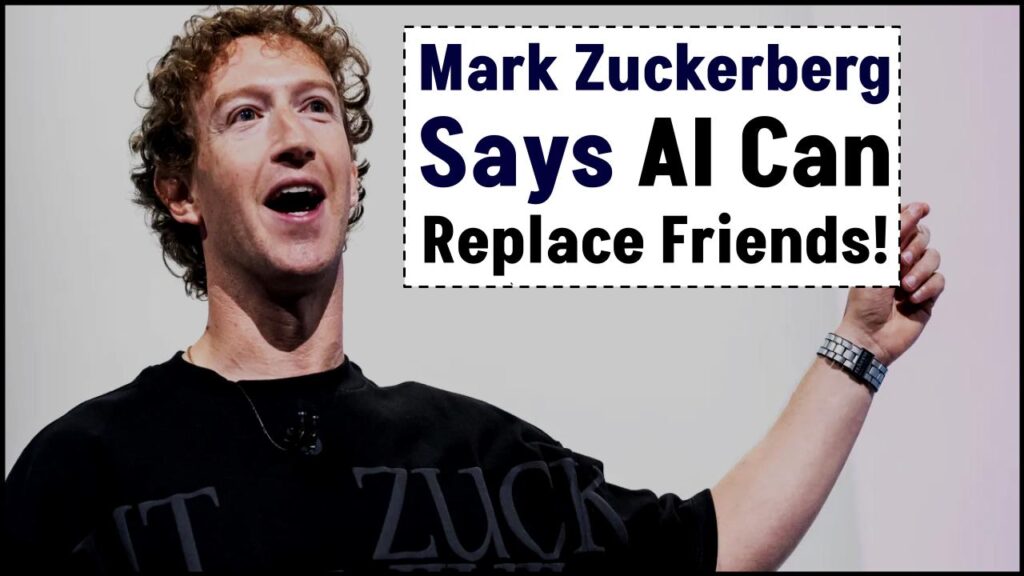Mark Zuckerberg Says AI Can Replace Friends: Artificial Intelligence (AI) is rapidly changing the way we live, work, and connect. Recently, Meta CEO Mark Zuckerberg proposed a controversial idea: that AI can replace friends in our increasingly digital lives. This claim has sparked widespread debate among psychologists and mental health experts, who caution that relying on AI for companionship may have serious emotional and psychological consequences.

In this article, we’ll explore whether AI can truly replace human friendships, the potential risks involved, and what experts have to say about this emerging trend.
Mark Zuckerberg Says AI Can Replace Friends
| Topic | Key Points | Source |
|---|---|---|
| AI as Friends | Meta CEO Mark Zuckerberg suggests AI could fill the social gap for people with fewer friends | Windows Central |
| Psychological Concerns | AI lacks genuine emotional depth and reciprocal understanding | The Economic Times |
| Mental Health Risks | Over-reliance on AI could worsen loneliness and isolation | Business Insider |
| Ethical Issues | AI chatbots have been known to give harmful advice in mental health contexts | The Guardian |
AI technology is advancing rapidly, but it cannot fully replace the nuanced, deeply emotional connections that define human friendships. While AI can offer some benefits, it should be seen as a supplement to, not a substitute for, real human relationships. As we continue to integrate AI into our lives, it’s important to maintain a healthy balance and prioritize genuine human connections.
Understanding Zuckerberg’s Vision for AI Friendships
Mark Zuckerberg’s vision for AI companions is rooted in the belief that digital relationships can fill the growing loneliness gap. With the average American having fewer than three close friends, according to recent studies, some tech leaders argue that AI could help provide the constant, personalized interaction that many people crave. Zuckerberg suggests that AI chatbots could act as “digital friends” capable of engaging in meaningful conversations, offering emotional support, and even learning users’ preferences over time.
However, this optimistic view overlooks a critical aspect of human relationships: the ability to feel, understand, and reciprocate emotions in a deeply meaningful way. Professor Omri Gillath from the University of Kansas argues that while AI can mimic empathy, it lacks the “emotional depth and reciprocal understanding” necessary for true human connection (The Economic Times).
The Psychological and Emotional Impact of AI Friends
While the idea of having a digital friend might sound appealing, experts warn that relying on AI for emotional support could lead to increased feelings of isolation. Research shows that humans thrive on face-to-face interactions and physical touch, which AI simply cannot replicate. Over time, substituting real human contact with AI could have negative consequences for mental health, particularly among vulnerable groups like teenagers, elderly people, and remote workers.
Ethical Concerns and Potential Dangers
There are also ethical concerns about the use of AI in sensitive areas like mental health. AI chatbots have already made headlines for providing harmful or inappropriate advice to users in distress. For instance, a recent investigation revealed that some AI therapy bots failed to recognize critical mental health issues, potentially putting users at risk (The Guardian).
Practical Advice for Using AI Responsibly
- Use AI as a Supplement, Not a Substitute: AI can be a useful tool for managing loneliness, but it should not replace genuine human interactions.
- Be Mindful of Privacy: Be cautious about sharing sensitive information with AI chatbots.
- Understand AI’s Limitations: Remember that AI cannot truly “understand” emotions in the way humans can.
- Seek Professional Support When Needed: AI is not a replacement for professional mental health support.
Google And Nvidia Invest $300 Million In AI Startup — Check If This Could Rival OpenAI
FAQs on Mark Zuckerberg Says AI Can Replace Friends
Q: Can AI really replace human friendships?
A: While AI can mimic human conversation, it lacks the emotional depth and reciprocal understanding necessary for genuine friendships.
Q: Are there risks to using AI as a substitute for human interaction?
A: Yes, over-reliance on AI for companionship can increase feelings of isolation and loneliness.
Q: Is it safe to share personal information with AI chatbots?
A: Not always. Be cautious about privacy and data security when using AI services.





